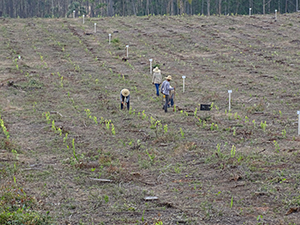 Mixed Forest plantations for climate Change mitigation and adaptation
Mixed Forest plantations for climate Change mitigation and adaptation
Forest landscape restoration and afforestation have recently received much international attention as a crucial opportunity for mitigating climate change (CC). Therefore, it features prominently in many political initiatives such as the EU Green Deal and the Bonn Challenge. Yet, the ongoing increase in biotic and abiotic stress driven by CC puts forests under threat. In the face of CC, adaptation and mitigation by forests are ultimately linked, because the ability of forests to sequester carbon (C) in the long run depends on the ability of trees to cope with multiple stresses. A growing body of evidence suggests that mixed forest plantations, i.e., plantations where several tree species are mixed, are more efficient in sequestrating C, while better coping with CC-related stress. Mixed plantations thus represent an opportunity for an important nature-based solution for CC mitigation and adaptation.
However, monocultures still dominate the world’s forest plantations. The reasons for the apparent resistance to mixed plantations among landowners and stakeholders need to be identified and addressed in future forest policies to promote the large-scale expansion of more CC-resilient mixed forest plantations. One of the possible factors that may have prevented the expansion of mixed plantations at large scales is insufficient scientific evidence for practitioners and policy-makers.
Objectives
The overall objective of the MixForChange project (https://treedivnet.ugent.be/ProjectMixForChange.html) is to promote mixed-species forest plantations as nature-based solutions to fight the causes and consequences of climate change, by providing science-based recommendations and guidelines endorsed by forest owners, man-agers and policy-makers. The project will rely on an existing unique global network of forest biodiversity experiments (TreeDivNet, http://www.treedivnet.ugent.be/index.html), which are based on a common, statistically sound design that allows for the effects of tree species composition on ecosystem services and functions to be tested
Implication Eco&Sols
Project coordinator
Aims
Using a global network of forest biodiversity experiments (TreeDivNet), we will provide a mechanistic understanding of how tree diversity, species identities and management (thinning and fertilization) influence both the potential of mixed forest plantations to mitigate (C sequestration) and adapt (drought and herbivory resilience) to CC, in a win-win approach. In addition, we will translate this knowledge into guidelines that can be widely adopted by practitioners and policy-makers.
Date
2021-2023
Funding
BiodivERsA program, under the Horizon 2020 ERA-NET COFUND scheme
Partners
- Joannès Guillemot, Centre de coopération internationale en recherche agronomique pour le développement (CIRAD, project manager)
- Guerric le Maire, CIRAD
- Agnès Robin, CIRAD
- Nicolas Martin-StPaul, Institut national de recherche pour l'agriculture, l'alimentation et l'environnement (INRAE)
- Hervé Jactel, INRAE
- Bastien Castagneyrol, INRAE
- Nicolas Fanin, INRAE
- Damien Bonal, INRAE
- Lander Baeten, Ghent University
- Kris Verheyen, Ghent University
- Stéphane Declerck, Université catholique de Louvain
- Quentin Ponette, Université catholique de Louvain
- Martin Weih, Swedish University of Agricultural Sciences
- Carolyn Glynn, Swedish University of Agricultural Sciences
- Jürgen Bauhus, University of Freiburg
- Michael Scherer-Lorenzen, University of Freiburg
- Christel Baum, University of Rostock
- Hans Sandén, University of Natural Resources and Life Sciences in Vienna
- Boris Rewald, University of Natural Resources and Life Sciences in Vienna
- Pedro Brancalion, University of São Paulo / ESALQ
- Benjamin Caldwell, Food and Agriculture Organization of the United Nations (FAO)
- Christian Messier, Université du Québec à Montréal
- Alain Paquette, Université du Québec à Montréal
- William Parker, Ontario Forest Research Institute
- Simone Mereu, University of Sassari
Contatct
Joannès Guillemot UMR Eco&Sols Cirad
email :






